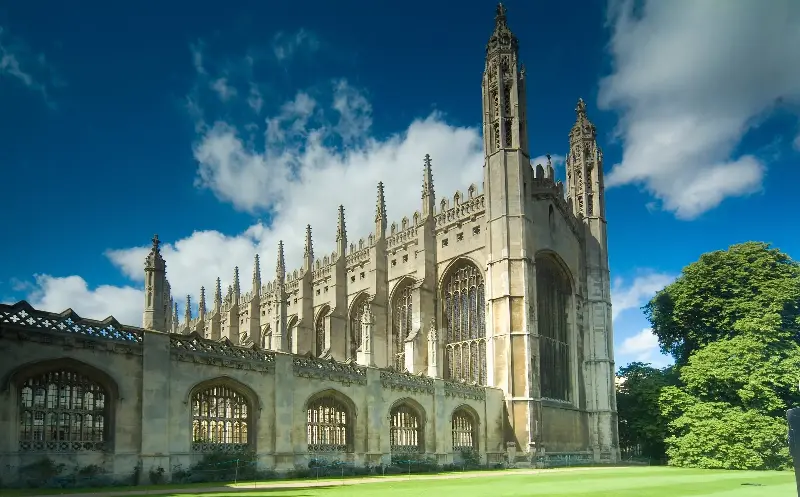
As a new academic year begins, with a fresh cohort of students having just arrived, few institutions are more vital to Britain’s future than the University of Cambridge. For centuries, it has been a crucible of discovery, shaping the minds and breakthroughs that have defined our national character. Today, it is not just an academic powerhouse – it is one of our best hopes for a decade of innovation-led growth.
I came to Cambridge from the United States, drawn by its reputation and promise. In my first two years here, I’ve seen something extraordinary: a university that can contribute to Britain at a scale no single American institution can match. Cambridge is a national university – not in name, but in mission. It serves the country by producing excellence, driving innovation, and creating opportunity.
It is not only a place for the best and brightest students from across this country, and the world, but also the UK’s global shop window – a destination for international investors and companies seeking proximity to world-class minds and research. Last year, Cambridge raised over £1bn in venture capital, demonstrating the scale of confidence in this ecosystem. We’re home to more than 500 life sciences firms and over 600 high-tech companies, including 26 unicorns – those rare businesses valued at over $1bn. Cambridge research contributes more than £30bn a year to the UK economy, and companies based here have spent over £7bn on R&D in the last three years. With the right support, I believe it can deliver in 10 years what previously took 25.
The secret of Cambridge’s success lies at the intersection of mission, opportunity, and necessity. This is fertile ground for creation, invention, and innovation. The formula is deceptively simple: bring brilliant, motivated people together in a space of great intellectual richness, provide room for interaction, modest resources, and freedom – and let them run. They find their way to what is promising and lucrative, then back their ideas with follow-on investment.
That spirit has shaped the university’s major investments in recent decades, and it drives our approach now. West Cambridge began as a dumping ground for displaced departments. Today, with plans for a new phase of development, it is poised to become Europe’s leading location for AI, quantum, and climate research. The Cambridge Biomedical Campus started as a greenfield site for a hospital and lab. In the coming years, a new cancer research hospital and a children’s hospital will close the gap between bench and bedside, translating research into care. In the city centre, the Innovation Hub at Hills Road will bring together spin-outs, startups, corporates, venture capitalists, and researchers in one facility – taking inspiration from the transformation of Kendall Square in Massachusetts. The result there was a step change in their ability to translate research and attract talent. Cambridge can do the same.
Yet growth must not only be rapid – it must be fair. We want to be good partners with others in this city, and to encourage inclusive innovation that brings local and national benefits for everyone. Cambridge is a city of extraordinary wealth and opportunity, but also of stark inequality. Too many young people in the region feel locked out of the prosperity on their doorstep. If Cambridge is to be the engine of Britain’s renewal, it must deliver growth that creates opportunity across the UK. That means investing in skills, education, and aspiration. The Cambridge Maths School and the University’s Foundation Year are already giving talented students from disadvantaged backgrounds a pathway into higher education and high-value careers.
This autumn, I will visit a region from which we are keen to attract more students: the North-East of England. Just as I have done in the South-West and the North-West, I look forward to hearing views from students, parents, and teachers, and learning how we might better attract talent. Encouraging talented students to consider Cambridge is not about lowering standards, despite what some might think. It is about giving ourselves the best chance of finding brilliant and motivated young people to do great things.
The stakes are national, not local. Cambridge produces the visionaries, leaders, and entrepreneurs this country needs – you only need to look at the 125 Nobel Laureates Cambridge has produced, more than most countries. Research breakthroughs ripple across the UK economy, creating jobs, attracting global capital, and strengthening Britain’s global standing. The recent Cambridge-Manchester Innovation Partnership illustrates this point, linking two powerhouse regions to amplify one another’s strengths. Cambridge is not competing with Manchester, Oxford, or London – it is complementing them.
The UK’s leading research universities are huge assets to this country, and Cambridge is one of the jewels in the crown. It shapes the innovators and leaders of tomorrow. It is Britain’s innovation engine – one that can attract investment and deliver a decade of growth to secure Britain’s place as a global leader in science and technology. Coming to this country as an American, familiar with the university model across the pond, I’ve been profoundly struck by how deeply Cambridge is woven into the life of this nation.
Professor Deborah Prentice is vice-chancellor of the University of Cambridge
